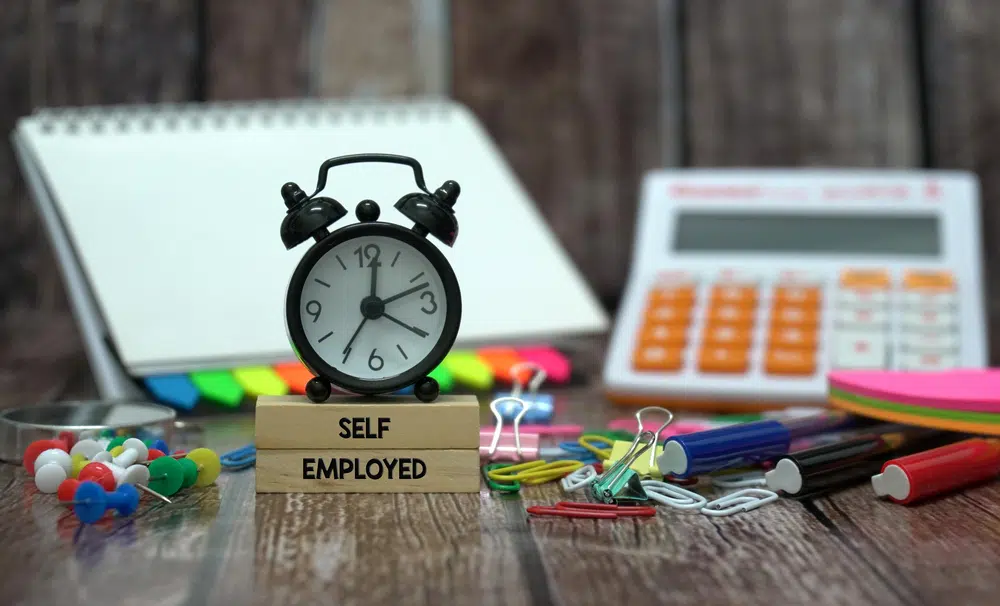
Potential clients should be researched thoroughly and detailed plans for promotion and marketing should be made prior to getting started. The impact on personal life must not be overlooked—longer working hours and uncertainty of income may lead to increased stress levels.
While going self-employed has its own set of challenges, those who are organised and motivated can reap the rewards it brings with careful consideration of every aspect before taking the plunge.
Though, it isn’t all easy going in the self employed world and there can be many obstacles to overcome on your way to the top, or just getting to a place you’re financially comfortable in.
There are as many advantages to disadvantages when it comes to turning self-employed and we’re here to talk you through them, so that you can gain greater insight into which path is right for you.
How to go self employed
In the UK there are over five million self-employed people right now, they contributing £305 billion to the national economy. Everyone will know someone who has been self employed at some point, how to you go from employed to self employed? Read our guide to going self-employed.
People have many different reasons why they want to enter the self employed space, they may want to be their own boss or have more flexibility on how their days are structured. The industrial sector you are in may command a much higher rate than the salary you’d be able to achieve as an employee.
New business venture
In the vast majority of cases, being self-employed means being the owner of a business. The way to get out of working for someone else and start working for yourself is to start a business of your own, but this involves a lot of hard work. Beginning a new company from the ground up can be extremely challenging, imply because there is so much you need to have ready going into it.
You’ll need a great money-making idea, an extensive business plan that covers all bases and the required funding in order to get your new business up and running. You’ll need a strategic plan on how you’ll capture the attention of clients and customers and then the knowledge of exactly how you’ll keep them beyond their first visit to your business.
You’re going to need a plan
It’s important to have a clear plan for your business when beginning a new venture. Have clear goals and set yourself deadlines to have pieces of your planning done by. Not only will planning lay out clearly what you need to complete in order to achieve your business goals, it will also help to keep your finances stable. Include budgeting in your planning process and allow yourself plenty of time to complete objectives.
All successful businesses start with a plan, it doesn’t necessarily mean you have to stick to it completely over time, but it will help to guide you and keep you on the right road at the start of your business and beyond. Your plan can include all kinds of things, meaning it will likely be unique and completely different to others.
All business plans are different, but share a few key similarities throughout. Your plan may cover elements such as social media, venture capital, how much office space you’ll need, etc. This is how widespread they can be and why it’s such a good idea to create one. If your business required a bank loan, you would also most likely have to show your business plan to a representative of your chosen bank too.
Having a business plan will also prove the viability of said proposed business to yourself. Instead of relying on your passion alone to create something, you’ll be able to get a clear glimpse of how exactly your idea will raise self employed business finance and generate profit. This will also tell you if you have something that can go long term and if you have access to everything businesses require.
Employed vs self employed
The main thing you need to consider when deciding if you should go self-employed is the lifestyle change that comes with it. It packs many advantages and can give people a much greater sense of freedom, though it won’t be appreciated by everyone who adopts it.
The financial risk of going self employed can be a huge turn off for many people and the main thing that holds them back from making the lifestyle change. Setting up a business comes at a high price most of the time and swapping a guaranteed monthly wage salary for the unknown isn’t an easy decision to make.
Some people also look at changing from a sole trader to a company. This is done by using a limited company to trade though, so technically at this point they are not self-employed but rather employed by the limited.
Can I go self employed while working?
Yes you can go self employed while working for someone else. This means you’re both self-employed and employed, and you’ll pay tax through both PAYE and will need to file a Self Assessment by the end of January every year.
You could also be self-employed but only work for one company (for example if you have a single major client), but in this case HMRC will recommend you complete their employed or self employed test to make sure that the company isn’t just calling you ‘self-employed’ to avoid paying National Insurance contributions and giving you employment rights. To count as self-employed you usually need to have choice over when and where you work and you’ll usually be paid when you issue invoices.
The perks of being self employed
Here are some of the positives to going self-employed:
- Greater flexibility and control of your working life will likely prove to be beneficial in other areas: spending time with family, gaining a social life again, etc.
- Work may become more varied as you work on different things from one week to the next, meeting new clients along the way
- You’ll be able to get creative and show off a side to you in that realm that wasn’t visible in your previous office job
- Travel costs will become a thing of the past for you if you choose to work from the comfort of your own home.
- You may end up earning more money than before as you won’t be limited to a certain salary, so the harder you work the more you may potentially earn
- Not having to make your daily commute will award you added free time that may not have been available to you before
The negatives of being self employed
There are some negatives that can raise concern when turning self-employed:
- Finding and developing a brand new client base can prove to be extremely challenging at first
- there are likely to be some start-up costs, so you may need some money to get started
- There will be no guaranteed income, which is understandably a major concern for people when thinking of going self employed
- It may seem like you have no back-up when things are going wrong as both the success and failure of the business will weigh heavily on your shoulders
- You won’t have any paid holidays or sick days because your work is the only thing that brings in the cash when you’re self-employed
- Being self-employed can make it more difficult for you when applying for a mortgage, getting hold of a loan, etc.
The questions you need to ask yourself before going self-employed
Going self-employed can be an extremely exciting and often rewarding time for those that are brave enough to embark on the adventure. However, you should certainly take your time and weigh up the effects such a change would have on you, both financially and personally. Here are the questions you need to ask yourself before you turn self-employed.
Are you ready to be self-employed?
Are you in the right stage of your life to go into self-employment? You need to calculate whether or not you’re doing this for the right reasons, because it can be a financial fall if you’re used to earning a high salary in your stable, well-paid position at work.
Can you afford to be self-employed?
As we’ve previously mentioned, if you’re used to earning a regular, decent living, you’ll need to be prepared to give that up, at least for a little while. We’re not saying you self-employed journey won’t prove to be financially fruitful, we’re simply suggesting that it make take some time to build up to that point. Do you have the spare cash to back yourself up if you run into some testing times with no wages to fall back on?
Should your savings fund your business?
If you’ve been saving for years to prepare for retirement and later life, are the goals you have for that time period worth potentially giving up on so you can go self-employed? For some the answer will be and quick and easy yes, but for others it might be worth considering what life will look like after your employed days are over.
Is your idea ultimately good enough?
Working out whether or not your self-employed strategy will be good enough to make you a living can be tough. The fact is that if you aren’t offering a product or service that people will have a need for and find valuable, it won’t earn you a good living.
You need to have a killer idea that people can get on board with and until you come up with one, you might wont to hit the breaks on the idea of being self employed. If you already have one and you’re sure about it however, then full steam ahead; go out there and change your life for the better.
F.A.Q’s
[sc_fs_multi_faq headline-0=”h3″ question-0=”How do I go self employed in the UK” answer-0=”If you are thinking about going self employed in the UK, the first thing you need to do is to register with HMRC. ” image-0=”” count=”1″ html=”true” css_class=””]Lee Jones is a seasoned Business Finance Specialist with over two decades of invaluable experience in the financial sector. With a keen eye for market trends and a passion for helping businesses thrive, Lee has become a trusted advisor to countless organizations seeking to navigate the complexities of finance.


